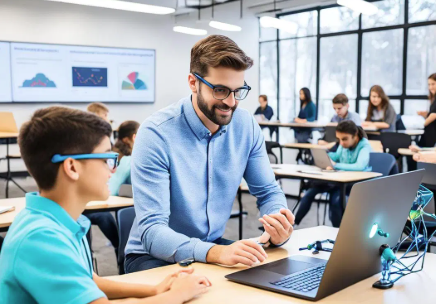Article:
In 2025, artificial intelligence (AI) is making a meaningful impact in classrooms by enhancing personalized learning. By supporting teachers and students with real-time insights, adaptive feedback, and data-driven decisions, AI is helping to create more effective, responsive, and engaging learning environments.
Adapting to Individual Learning Needs
AI-powered tools can analyze how each student learns best and adjust instruction accordingly. These systems track progress and identify patterns, enabling personalized pathways for students based on their strengths and challenges. Whether a student needs additional support in math or wants to explore advanced reading materials, AI helps tailor the experience to meet individual goals.
Real-Time Feedback and Support
One of the most valuable features of AI in education is the ability to provide instant feedback. Instead of waiting for teacher reviews, students receive guidance as they work—correcting mistakes, offering hints, and suggesting resources. This immediacy helps students stay engaged and build confidence as they move through lessons.
Helping Teachers Focus on What Matters
AI doesn’t replace teachers—it supports them. With the help of data dashboards and automated progress tracking, educators can spend less time grading and more time mentoring. AI helps identify which students may need extra attention and which instructional strategies are working best, enabling more meaningful teacher-student interactions.
Expanding Access to Resources
AI platforms often include a range of learning tools, such as videos, quizzes, games, and interactive exercises. These resources are selected based on the student’s current level and learning preferences. By delivering content that matches a student’s pace and interests, AI contributes to a more engaging learning journey.
Supporting Inclusive Learning
Personalized learning supported by AI is helping to make education more inclusive. Features such as speech-to-text, translation tools, and visual aids assist learners with diverse needs. This ensures that more students—regardless of background or ability—can access and benefit from quality education.
Conclusion
AI is reshaping personalized learning by making it more dynamic, inclusive, and efficient. As technology continues to evolve in 2025, it will play an even greater role in helping educators deliver individualized support and helping students reach their full potential. When used thoughtfully, AI becomes a valuable partner in the shared goal of student success.














